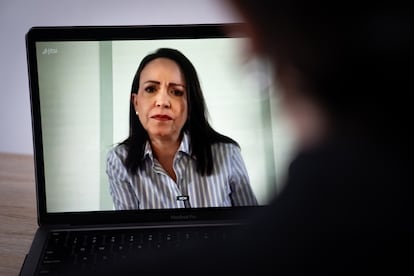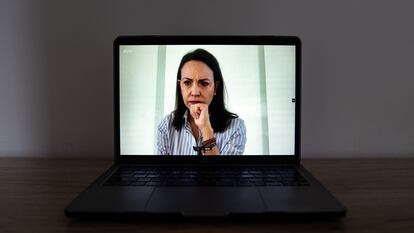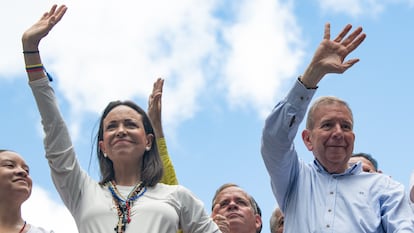María Corina Machado: ‘The regime forced Edmundo to leave; he didn’t want to’
Venezuela’s opposition leader is convinced that President Nicolás Maduro tried to weaken the opposition by forcing the candidate who most likely won the election into exile, but she believes he has not succeeded


María Corina Machado believes that the government of Nicolás Maduro subjected Edmundo González to a psychological terror that pushed him into exile. The 75-year-old man who ran for election on behalf of Machado and who presumably defeated Maduro at the polls — unless the Chavista regime produces documentation proving otherwise — endured almost 40 days of pressure after the vote, during a period in which the Attorney General’s Office investigated and prosecuted him while Chavista leaders accused him, without any supporting evidence, of being a fascist and a coup plotter.
Edmundo González, who unexpectedly received the task of ending 25 consecutive years of Bolivarian revolution, decided to seek asylum in Madrid. In an interview with EL PAÍS, Machado says that Edmundo González was the one who had the last word, but that he found himself cornered, physically and mentally, a fact that pushed him to make a decision that breaks the opposition’s strategy of securing the support of the international community, open a negotiation process with Maduro to get the latter to accept defeat, and place the presidential sash on him on January 10, 2025.

Days before boarding a Spanish Armed Forces plane with his wife, Edmundo González informed Machado about his decision. “We spoke with the same frankness with which we spoke about this entire process that we have gone through together. With full awareness of the implications. The regime has exerted very cruel pressure, they have no scruples, they are capable of overstepping any boundaries. They use methods to spread panic in society. They orchestrated multiple actions to make Edmundo feel that his life was in danger,” says Machado on the other side of the screen, from the secret place where she is sheltering.
The exile was agreed upon in a three-way deal between the opposition, the Maduro government and Spain. The weight of Spanish mediation was borne by José Luis Rodríguez Zapatero, a former prime minister of Spain. Zapatero maintains open lines of communication with Maduro and his closest entourage, which in the past has helped him to free political prisoners, among other matters. “Everyone knows that the Rodríguez brothers [Delcy and Jorge, the main political operators of the Venezuelan president] were in on the negotiation. The regime wanted Edmundo to leave, they forced him; he did not want to leave.” As for Zapatero’s diplomatic work, Machado adds: “It was an operation that also included other actors who disguise themselves as the opposition. Artful people who come to offer a safe conduct, but deep down they are operators of the regime itself. Everyone knows who I am talking about.”

Although Maduro has been ratified as president by the Supreme Court of Justice — a measure that has not surprised anyone, since the court is controlled by a second-rate Chavista bureaucrat — Machado sees Maduro and his government as weaker now, without national or international credibility: “How much internal support has Maduro gained in these 60 days? How much has he lost? How much international support? How much additional support have Edmundo and I received? For me, this is a fundamental point. I have no doubt that the regime carried out this operation with the aim of weakening us, weakening our strategy. They were wrong, Edmundo was unduly pressured to leave, he did not want to leave. What it did was unite us and align us even more; it will be an increasingly bigger job.”
She is excited about the approval in Spain’s lower house of parliament of a non-legislative proposal to recognize González as the lawful president of Venezuela, a non-binding move that will also be examined by the Senate; as well as by a vote due to be held in the European Parliament for the same purpose. Machado assures that within Chavismo, people also recognize the real result of the July election, because it is very evident and they cannot cover their eyes about it. “The most damaging tool that the regime has is not lies and terror, it is demoralization,” says Machado. “That must be fought. They told us that the extraordinary was impossible, that it was impossible for Edmundo to win, but we achieved it. Now it is time to finish it off and for Maduro to recognize his defeat. And for a transition to come,” she adds.
―What do you think of the mediation being carried out by the presidents of Colombia, Mexico and Brazil?
―Today I don’t see that mediation. There was a good disposition because these are countries with channels of dialogue with Maduro. And above all Colombia and Brazil are the most affected countries, not only by the terrible effect of migration, but by the intrinsic destabilization of the regime. It affects everything from El Tren de Aragua (a criminal gang), to drug trafficking, the smuggling of minerals and human beings. What Maduro has done has been cruel, the U.N. report is heartbreaking, it points to state terrorism. It is so brutal that it is no longer just a matter of a dictator who stays in power because he wants to, there are crimes against humanity.

―These presidents agreed in a meeting between them that it was best for Edmundo González and Maduro to negotiate directly and for you to stay out of it.
—You published that, but I was never told anything directly. Any agreement like ours has to be endorsed by Venezuelan society, it cannot be imposed by external actors. If Maduro is intelligent, he will be able to get out of power more easily through negotiations.
The entourage of Gustavo Petro, the Colombian president, maintains that right now, after González’s exile, the negotiations have entered a plateau, but they hope to regain the initiative. They do not see that Spanish mediation can work, since Machado herself and González do not fully trust it. Machado is very terse and evasive when asked about Spain’s role: “I am not going to speculate on any of these processes. We need Spain, but I am not referring to the government, but to the country of Spain, to the citizens, to all its political forces.”
This is even no longer a political issue, but rather one of business and economic stability. “Multinationals need to support a democratic transition, for their own interests. Stakeholders, creditors and oil companies in Europe and Asia need it. In the end, the situation with Maduro is not stabilizing, we have seen a lot of money invested in lobbying, in minimizing his crimes, but it doesn’t work. Venezuela is in last place in the rule of law, it does not bring security to investors.” In an interview with foreign correspondents a week ago, the opposition leader asked the president of the United States, Joe Biden, to get more involved. Who else is she disappointed with? “We have excellent international support. Some are more cautious than others, but they all add up.”
Experts say that part of the success of carrying out a transition will depend on convincing the soft sectors of Chavismo and the military establishment, which has historically been in favor of democracy and has facilitated the recognition of candidates who were denied victory. “I have contacts within Chavismo,” Machado admits, since before the elections and even more so now. “A document was presented to the country in which there are people within Chavismo who are in favor of other ideological positions and eager for a republican consensus for what is to come, far beyond the rejection and disavowal of the regime. We are united in recovering not only freedom, but also the Republic and the nation.”
Machado, who in two years has generated a movement that has mobilized millions of people throughout the country, exhausted by the Bolivarian revolution after a quarter of a century of continuous power, shows absolute conviction in change in Venezuela, even though Chavismo, for now, has not budged an inch. In her words there is not a single crack, not a single phrase through which discouragement might creep in. In Machado there lives the fire of those who believe themselves called to a cause greater than themselves.
The photographer was unable to organize a photo shoot for this interview because Machado is hiding in a place that cannot be revealed.
―If you were cornered, even to the point where your life was at stake, would you consider exile like Edmundo González?
“I have never thought about exile and I am working to prevent this from happening. I do not want to be told about exile, humanitarian aid, or persecution. The international community must give us their support to liberate the country and for Edmundo to be recognized as president.”
Sign up for our weekly newsletter to get more English-language news coverage from EL PAÍS USA Edition
Tu suscripción se está usando en otro dispositivo
¿Quieres añadir otro usuario a tu suscripción?
Si continúas leyendo en este dispositivo, no se podrá leer en el otro.
FlechaTu suscripción se está usando en otro dispositivo y solo puedes acceder a EL PAÍS desde un dispositivo a la vez.
Si quieres compartir tu cuenta, cambia tu suscripción a la modalidad Premium, así podrás añadir otro usuario. Cada uno accederá con su propia cuenta de email, lo que os permitirá personalizar vuestra experiencia en EL PAÍS.
¿Tienes una suscripción de empresa? Accede aquí para contratar más cuentas.
En el caso de no saber quién está usando tu cuenta, te recomendamos cambiar tu contraseña aquí.
Si decides continuar compartiendo tu cuenta, este mensaje se mostrará en tu dispositivo y en el de la otra persona que está usando tu cuenta de forma indefinida, afectando a tu experiencia de lectura. Puedes consultar aquí los términos y condiciones de la suscripción digital.








































